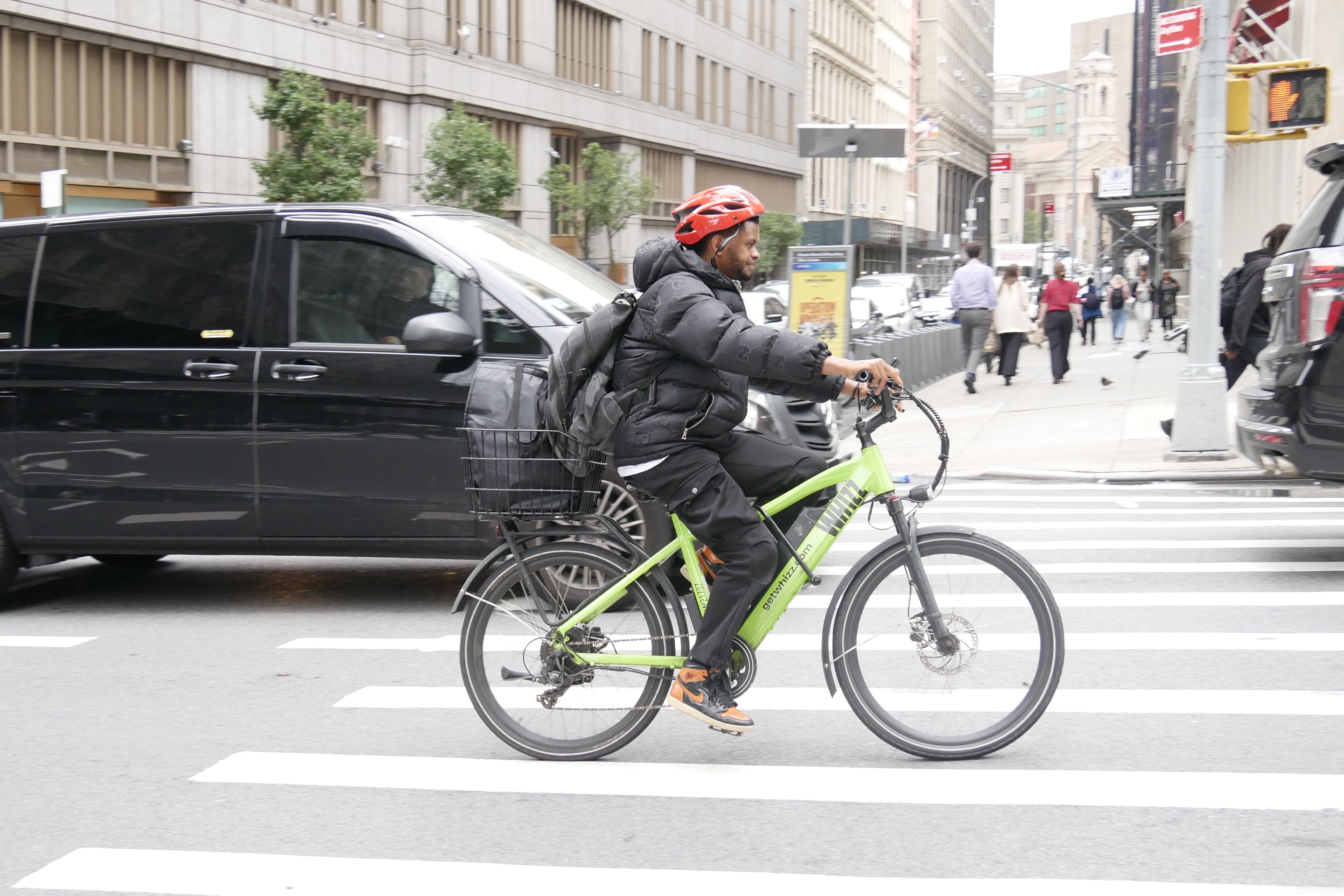I know you're sick of exhilarated by me complaining about the Times's car-centric "street wars" coverage, so today, I'll let Streetsblog reader Julia Lichtblau respond to the latest cognitive dissonance from Nestor A. Ramos's Metro section, another flat piece titled, "Where Do Those Painted White ‘Ghost Bikes’ Come From?" (Hmmm, where indeed?).
Here's Lichtblau's letter to the editors of The Times.
To the editors:
As a daily bike rider and former reporter/editor (Businessweek, Dow Jones), I follow with interest both the substance and language of your coverage of the long-overdue process of weaning NYC away from cars. "Where Do Those Painted White ‘Ghost Bikes’ Come From?" does highlight that a collision between a car and a bike is generally fatal to the cyclist, but the substance and language in this piece and the series continues to prioritize the delicate sensibilities of motorists, for example, quoting the ghost bike activist as saying he starts his car every day. Why does that matter — from a news or policy perspective? Is the point only valid if alternative transportation activists admit to driving?
An SUV — the dominant car on our crowded streets — weighs 6,000 pounds, a bicycle about 25 pounds. Yet your list of remedies starts with "Inform or Remind Bikers of the Rules," and only one envisions protected bike lanes, the single most effective means of keeping cyclists and cars apart.
The others are thought exercises. You quote Leah Todd, an activist, as saying, "We have had several deaths in bike lanes." The suggestion is that bikers are killing each other, which isn't true. I suspect Ms. Todd had many more forceful things to say about dead cyclists and the cars that killed them which were filtered out in the writing or editing.
As your reporter must or should know, the vast majority of city bike lanes are unprotected and constantly abused as parking and unloading lanes by trucks and cars, forcing riders into traffic. A rider can seldom ride a block without obstruction. Moreover, drivers, especially truckers, routinely violate protected bike lanes with impunity — even under the eyes of police officers, who also freely appropriate bike lanes for their non-emergency convenience.
I understand the need to balance coverage, but sometimes a wrong is a wrong. As a society, we are rethinking our language about many issues because of the faulty and prejudiced assumptions they mask. "Accident" is one of those words. A collision between a car and a bike is not an act of God or lack of good manners — if only we allowed the other fellow to go first. It's an accumulation of deliberate and often habitual bad choices — to go much faster than the speed limit or traffic conditions allow; to fly into a rage at some perceived offense; to use a cell phone while turning; to ignore school zone signs; and often by someone who makes those choices routinely and has many violations to show--information easily obtained by looking up a license plate number.
It's hard not to see in the Times's "bothsideism" on this issue — as with many — an effort not to alienate car-loving conservative, suburban readers. Perhaps rather than trot out the obligatory tepid accommodations, go for real reporting with experts and regular folks in countries and cities that have pushed back against cars and see how their quality of life has improved.
Are there ghost bikes in Paris, Montreal, Munich, Stockholm? Not that I know of.
Julia Lichtblau
Couldn't have said it better myself.
In other news:
- Like Streetsblog, other outlets followed up our scoop on Monday about the Sanitation Department's decision to oversee a problem trash company. (NY Post, Gothamist, Crain's)
- Flush luck: I've been covering New York City since 1990, so excuse me if I yawn at yet another mayor promising more public toilets. I'll believe it when I'm getting sweet relief in one of them (NYDN, NY Post, amNY). Meanwhile, Hell Gate focused on the mayor's bald-faced lie that the public can use the loo inside City Hall, which is cordoned off by police.
- Transit advocates will gather — again — at City Hall tomorrow to demand an expansion in the Fair Fares program so that hard-working people who happen to be insufficiently paid can get a break on paying for their transit commutes. (NYDN)
- There's nothing wrong with the city selling DOT souvenirs. (NYDN, amNY)
- Apparently, Pete and Colin don't need a second ferry. (amNY)
- A man in a wheelchair was struck and killed by a car driver in East New York. (News12)
- There's a growing movement to get kids off their phones. Gov. Hochul has joined it with a potential ban, as The City reported — but an easier, better idea is simply to create school streets so kids have safe places to play. Our friend Lenore Skanazy agrees!
Wow--I watched this 10-min vid w/ amazement & envy.
— Lenore Skenazy (@FreeRangeKids) June 2, 2024
Paris is SO SMART! They blocked off (beautifully--it's Paris) the streets in front of 100s of schools. More safety, walking, playing.
WE CAN DO THIS TOO!
More space/gathering--less time at home on phones. https://t.co/sGSIVE4TSa






